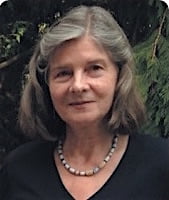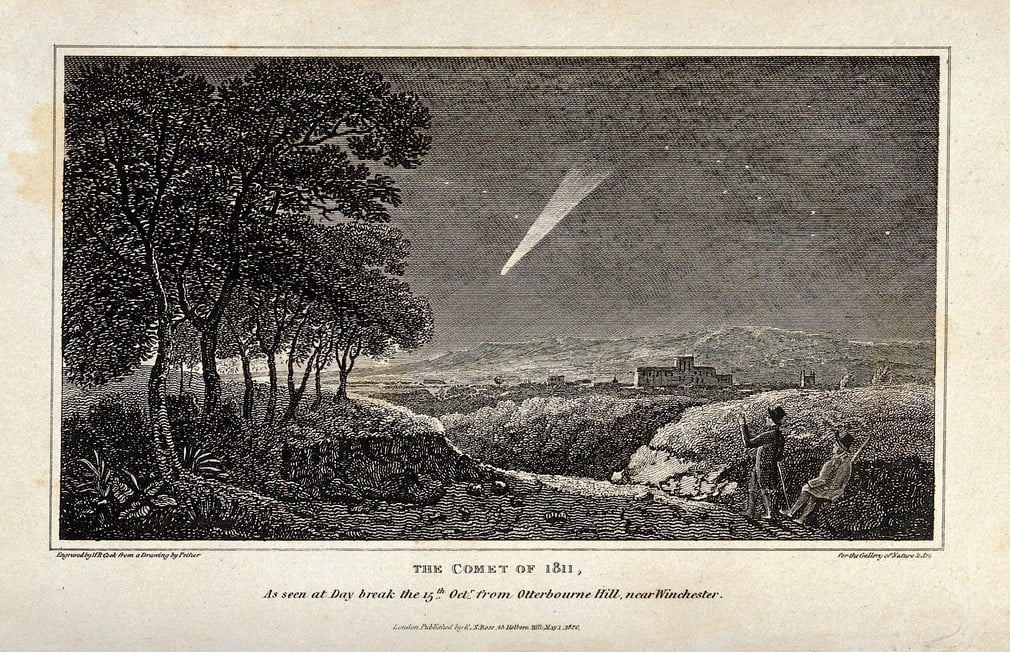#625 To Italy with Stendhal
A Promise on the Horizon
by Ann Pearson
Vancouver: Granville Island Publishing, 2019
$24.95 / 9781989467022
Reviewed by Valerie Green
*
 Ann Pearson’s work of biographical fiction, A Promise on the Horizon, will be greatly esteemed by historians, academic researchers, and lovers of the Napoleonic era.
Ann Pearson’s work of biographical fiction, A Promise on the Horizon, will be greatly esteemed by historians, academic researchers, and lovers of the Napoleonic era.
Pearson takes the reader on a delightful journey of discovery to Napoleon’s Italy through the eyes of two travellers — Henri Beyle (to be known later as Stendhal, the French novelist, 1783-1842) and a mysterious young woman, Marie Vernet, travelling alone — an unusual occurrence in those days.
The year is 1811 — a very auspicious time. It was called the year of the Emperor Napoleon’s Comet which appeared in the sky and was seen as an omen because, in March of 1811, the long-awaited heir to the Emperor was born. Most people thought this meant the old order was finally over and great new things lay ahead on the horizon. But, despite the dawn of a possible new dynasty, the prospect of war also still lies ahead.

Pearson bases her story on Beyle’s observations in his authentic 1811 journal where we learn about his motley group of fellow travel companions as well as his compelling and overbearing opinions. As Pearson herself says, “his frankness can still surprise the modern reader.”
She then introduces another traveller, Marie Vernet, the fictitious young woman whose account begins with these words:
For the first time in my life I am completely alone. Though I had anticipated the discomforts of the road, I had not foreseen the anguish on finding myself at nightfall in a place where I do not know a single soul. But I cannot turn back now (p. 6).
With these lines, Pearson hooks the reader into the story. Who is this woman? And what is she trying to escape from? Or run to?

Like Beyle, Vernet also appears to be searching for something. In her case, now that she is a woman of means, it is independence, while at the same time she is trying to come to terms with her past. In Beyle’s case, it is something far deeper. Bored with his life in Napoleon’s bureaucracy, he takes unauthorized leave from his post to search for happiness and a better understanding of his restless nature. He believes that by returning to Italy he might find answers.
Both protagonists are drawn to the rich culture of Italy and tell of their parallel experiences as they travel. It is intriguing for the reader to see life in 1811 from two different perspectives — a man’s and a woman’s.
In his diary, Beyle appears to be obsessed with love and women. He admits that he only seems happy in an intimate relationship and yet his fickle nature makes him incapable of faithfulness for long. In 1811, he is re-tracing a journey he made ten years earlier as a lovesick young man obsessed with a woman much older than he was. Meanwhile, Marie Vernet is constantly reflecting on her past and seems afraid to embark on an unknown future before accepting and understanding the past.

Although the book contains passages of vivid description, I found it lagged in places, weighed down by too much detail. Having said that, these descriptive passages would be invaluable to a researcher, despite not being particularly conducive to an attention-grabbing novel. In a non-fiction book on the Napoleonic era, they would shine.
However, Pearson explains her reason for writing A Promise on the Horizon in this way:
Stendhal kept copious notes on his Italian journey which I could reframe and interweave with fictional events to create this moment in the Napoleonic era when a threatened invasion of Russia is on the horizon.
For most of the book, Pearson manages to pull off this gigantic feat with an easy style. With so much material to work with, it must have proved difficult to omit anything. The story’s originality — through two different voices — is most certainly praiseworthy. The reader is left with the question: did the two travellers find their “promise on the horizon?”

“If the ghost of Henri Beyle has been reading over my shoulder,” confesses Pearson, “I owe him an apology for the liberties I have taken with his life and character…. ” (p. 307). I feel convinced that Beyle himself, as a writer, would probably be delighted with the way Pearson has brought his character to life for the reader.
An avid student of both Napoleonic history and Stendhal, Pearson has skillfully captured the era and all its nuances. Born in England, she gained a BA in French from the University of London and a Ph.D. from the University of British Columbia. During her career, she has taught French, women’s literature, and an introductory Humanities course (Arts One) covering great works from antiquity to the postmodern. She now lives in Vancouver and is currently working on a second Napoleonic-era novel, set in Cornwall. For more information, see here.

*

Valerie Green was born and educated in England where she studied journalism and law. Her passion was always writing from the moment she first held a pen in her hand. After working at the world-famous Foyles Book Store on Charing Cross Road, London, followed by a brief stint with M15 and legal firms, she moved to Canada in 1968, where she married and raised a family, while embarking on a long career as a freelance writer, columnist and author of over twenty non-fiction historical and true-crime books including Above Stairs, Upstarts and Outcasts, If these Walls Could Talk, Vanished: The Michael Dunahee Story, and Dunmora: The Story of a Heritage Manor House on Vancouver Island (Hancock House, 2017, reviewed in Ormsby #434 by Patrick Dunae). She is currently working on her debut novel Providence, which will be published soon as the first of The McBride Chronicles, an historical four-generational family saga bringing early BC history alive. Now semi-retired (although writers never really retire!) she enjoys taking short road trips around the province with her husband, watching their two beloved grandsons grow up and, of course, writing.
*

The Ormsby Review. More Books. More Reviews. More Often.
Publisher and Editor: Richard Mackie
The Ormsby Review is a journal service for serious coverage of B.C. books and authors, hosted by Simon Fraser University. The Advisory Board consists of Jean Barman, Robin Fisher, Cole Harris, Wade Davis, Hugh Johnston, Patricia Roy, David Stouck, and Graeme Wynn. Scholarly Patron: SFU Graduate Liberal Studies. Honorary Patron: Yosef Wosk. Provincial Government Patron since September 2018: Creative BC
“Only connect.” – E.M. Forster